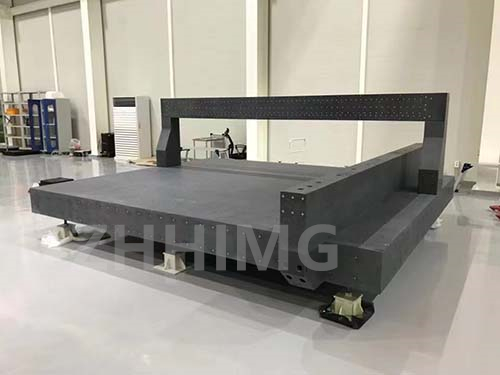As one of the most commonly used measuring instruments in the manufacturing industry, the bridge CMM (Coordinate Measuring Machine) provides high accuracy and precision in measuring objects’ geometrical properties.
The granite bed of a bridge CMM is critical to its accuracy and stability. The granite, a rigid and stable material, has a low coefficient of thermal expansion, which ensures the bridge CMM operates with low thermal drift and high accuracy. Therefore, the granite bed is one of the crucial components that affect the bridge CMM’s precision and accuracy. It's vitally important to maintain and calibrate it periodically to ensure reliable measuring data.
So, does the granite bed of a bridge CMM need to be periodically maintained and calibrated? The answer is yes, and here's why.
Firstly, during the operation of the bridge CMM, the granite bed could be worn or even damaged due to various factors such as collision, vibration, and aging. Any damage to the granite bed might induce a change in its flatness, straightness, and squareness. Even tiny deviations could lead to measuring error, damaging the reliability and quality of the measuring data.
Regular maintenance and calibration of the granite bed would ensure the bridge CMM's lasting accuracy and reliability. For example, by using a laser interferometer to measure the straightness and squareness accuracy, engineers can identify any deviations from the expected accuracy level. Then, they can adjust the granite bed’s position and orientation to maintain its accuracy benefits from working with a stable and rigid material like granite.
Secondly, manufacturing facilities that frequently use the bridge CMM may also expose it to harsh environments, such as high temperatures, humidity, or dust. Environmental changes could lead to thermal or mechanical stress on the granite bed, affecting its flatness and straightness. Thus, periodic calibration and maintenance would also help to minimize the impact of thermal and environmental changes on the granite bed.
Finally, regular calibration and maintenance of the granite bed could also improve the efficiency and productivity of the bridge CMM. A well-maintained granite bed ensures that the bridge CMM’s accuracy and stability are maintained at optimal levels. This means fewer measurement errors, less need to repeat measurements, and better efficiency. The improvement in productivity not only reduces production costs but also delivers faster and more accurate measuring data.
In conclusion, a bridge CMM's granite bed plays a crucial role in ensuring accurate and precise measurements in manufacturing, where high-quality production is mandatory. Periodic maintenance and calibration of the granite bed can minimize the effects of wear, damage, and harsh environments, thus, guaranteeing the long-term accuracy and reliability of the bridge CMM. Moreover, well-maintained granite beds help increase productivity, benefit quality control, and reduce production costs. Therefore, regular calibration and maintenance of the granite bed are essential steps in maintaining the bridge CMM's optimal performance.
Post time: Apr-17-2024

